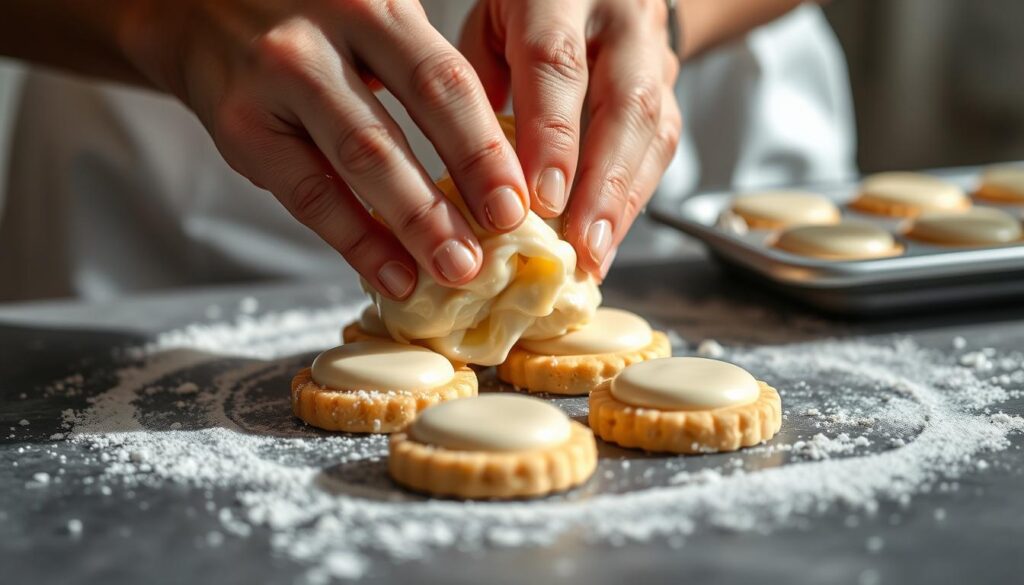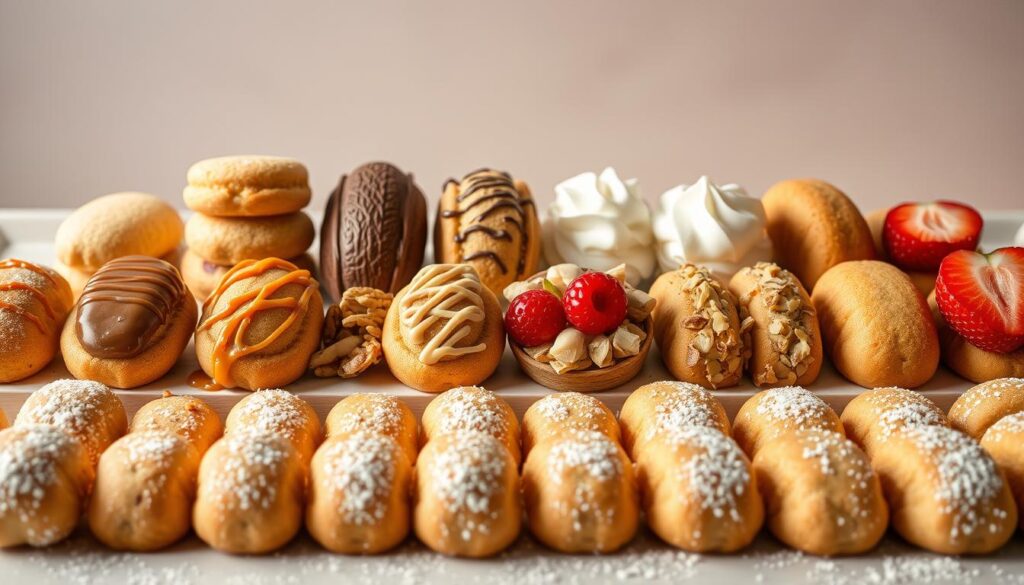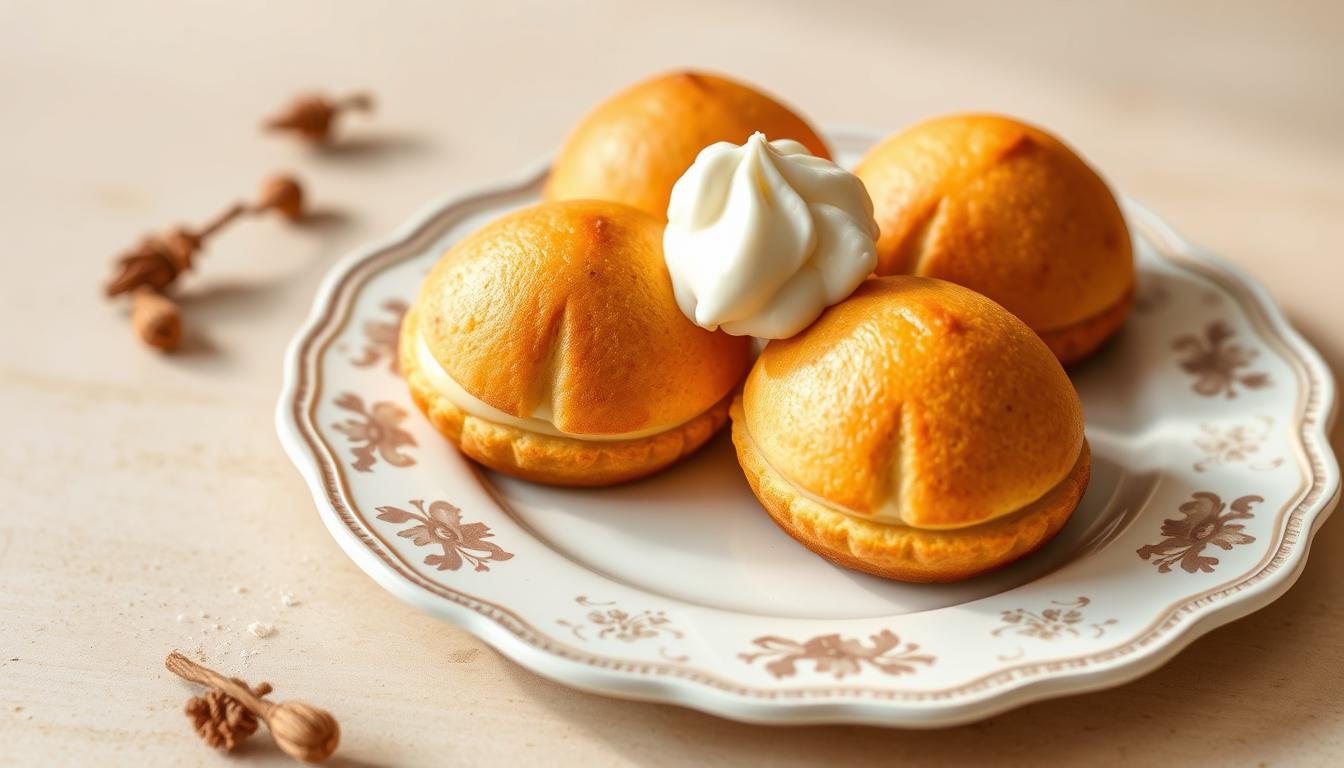A simple Madeleine cookie recipe using cream for a rich flavor.
madeline cookies recipe using cream
Every time I bite into a Madeleine cookie, I’m reminded of my grandmother’s kitchen. The delicate shell-shaped pastry, with its golden edges and tender crumb, is more than a treat. It’s a memory waiting to be savored.
Your journey to making the most incredible homemade Madeleine cookies starts here. This recipe will transform your baking, making a classic French delicacy truly extraordinary.
Traditional Madeleines are delightful, but adding cream makes them even better. The secret to unforgettable homemade Madeleine cookies is how cream improves texture and flavor.
Whether you’re an experienced baker or new to the kitchen, this recipe will help you make tender, rich, and irresistible Madeleines. Get ready to impress your friends and family with a classic French treat that’s both traditional and innovative.
The History and Origins of French Madeleine Cookies
The story of French Madeleine Cookies starts in Lorraine, France. These treats are known for their delicate taste and shell shape. They have a rich history that fascinates people all over the world.
There’s a legend about how these cookies got their name. It says they were named after a young kitchen helper named Madeleine Paulmier. She made them for French royalty in the 18th century.
“A cookie that tells a story is always more delicious” – French Culinary Proverb
Madeline Cookies have a unique history:
- They come from the Lorraine region in northeastern France.
- They were linked to King Stanislas’s royal court.
- They became a favorite tea-time snack in the 1700s.
Many stories exist about their origins. But one thing is clear: these cookies are a masterpiece of French pastry art. Their special shape and soft texture have made them a favorite for many years.
| Time Period | Cultural Significance |
|---|---|
| 18th Century | First documented appearance in French royal courts |
| 19th Century | Gained popularity in bourgeois French households |
| 20th Century | Became internationally recognized French delicacy |
Today, the easy madeline cookies recipe still charms bakers and dessert lovers. It keeps alive a delicious part of French culinary tradition.
Understanding the Magic of Adding Cream to Madeleines
Creamy Madeleine cookies are a tasty twist on the classic French treat. The secret to making these pastries special is adding cream. It makes their texture and taste even better.
Exploring the best Madeleine cookies with cream opens up a world of new flavors. Cream isn’t just an ingredient; it’s a game-changer. It turns these delicate shell-shaped cookies into something truly special.
The Science Behind Cream’s Effect on Texture
Cream adds several key benefits to Madeleine cookies:
- Creates a more tender crumb
- Increases moisture retention
- Provides a smoother, more luxurious mouthfeel
How Cream Enhances Flavor Profile
The creamy texture of cream makes the butter’s flavor richer. This creates a more complex and sophisticated taste. Your Madeleines will have a more indulgent flavor, setting them apart from traditional recipes.
Benefits of Using Heavy Cream vs Traditional Methods
| Characteristic | Traditional Method | Heavy Cream Method |
|---|---|---|
| Moisture | Standard | Enhanced |
| Richness | Moderate | Intense |
| Shelf Life | 3-4 days | 5-6 days |
Understanding these differences can make your creamy Madeleine cookies truly extraordinary.
Essential Ingredients for Perfect Madeleines
Making delicious Madeleine cookies with cream needs the right ingredients. Each one is important for the perfect taste and texture. Knowing how each ingredient helps is key to success.
Start with the best ingredients for amazing Madeleines. Here’s what you’ll need:
- All-purpose flour (cake flour works beautifully)
- Fresh eggs at room temperature
- High-fat unsalted butter
- Granulated sugar
- Heavy cream
- Baking powder
- Fine sea salt
- Pure vanilla extract
- Lemon zest (optional)
Every ingredient is vital for Madeleines’ light, spongy feel. The heavy cream adds richness and a tender crumb that’s irresistible.
“In baking, quality ingredients are the secret to extraordinary results.” – Professional Pastry Chef
Choose fresh, high-quality ingredients for your Madeleine cookies. Use room temperature eggs and butter for better mixing. Fresh cream brings out the best flavors and textures.
Pro tip: Use high-fat European-style butter and pure vanilla extract for the best Madeleines.
Required Kitchen Tools and Equipment
To make delicious madeline cookies with heavy cream, you need the right tools. The right equipment makes baking easier and helps you make perfect French pastries every time.
Must-Have Baking Tools
Here are the essential tools for making madeline cookies with heavy cream:
- Madeleine pan (traditional shell-shaped)
- Large mixing bowls
- Whisk or electric mixer
- Sifter for dry ingredients
- Precise measuring cups and spoons
Optional Equipment for Enhanced Results
These tools can make your madeline cookies even better:
- Piping bag for uniform batter distribution
- Zester for adding citrus zest
- Cooling rack for proper cooling
- Kitchen scale for precise measurements
Madeleine Pan Selection Guide
Choosing the right pan is key for authentic madeline cookies. Here are some options:
| Pan Material | Pros | Cons |
|---|---|---|
| Non-stick Metal | Even heating, durable | Can be expensive |
| Silicone | Easy release, flexible | Less precise heat distribution |
| Aluminum | Lightweight, affordable | May require greasing |
Pro tip: Always butter and flour your madeleine pan thoroughly to achieve that classic shell shape and prevent sticking.
Madeline Cookies Recipe Using Cream
Making madeline cookies with cream needs precision and care. This French pastry is known for its delicate texture and rich taste. It requires attention to detail.
To start making madeline cookies, you’ll need these ingredients:
- 2 large eggs
- 1/2 cup granulated sugar
- 1 cup all-purpose flour
- 1/2 cup heavy cream
- 1/2 cup unsalted butter, melted
- 1 teaspoon vanilla extract
- Zest of one lemon
The secret to great madeline cookies is in how you prepare them. First, whisk eggs and sugar until they’re light and fluffy. Then, fold in the flour carefully to avoid lumps.
Adding cream is key. Fold the heavy cream into the batter gently. This makes the mixture smooth and adds richness. The cream also helps create a tender crumb that’s soft to the bite.
- Chill the batter for 30 minutes
- Grease your madeline pan well
- Fill each mold about 3/4 full
- Bake at 375°F for 10-12 minutes
- Cool on a wire rack
Pro tip: Watch for the signature “hump” that forms during baking – a hallmark of authentic madeline cookies.
Your cream-infused madeleines will be golden and have a delicate shape. They’ll be soft inside. Dust with powdered sugar for a French touch.
Mastering the Mixing Technique

Making delicious cream-filled madeleine cookies is more than just a recipe. The way you mix them is key to getting that light and airy texture. This is what makes these French treats so beloved.
Mixing madeleines is an art that needs precision and care. You must understand how to mix ingredients right. This keeps the batter’s delicate structure intact.
Proper Ingredient Temperature Guidelines
Temperature is important when making cream-filled madeleine cookies. Here are some tips for the best results:
- Use room-temperature eggs for better mixing
- Make sure butter and cream are soft but not melted
- Let ingredients sit at room temperature for 30 minutes before mixing
Folding Methods for Perfect Texture
The folding technique is crucial for keeping your cookies light. Gentle folding helps keep the air bubbles in. This is what makes madeleines so special.
- Use a spatula to cut through the batter
- Fold ingredients from bottom to top in a circular motion
- Stop mixing when the dry ingredients are fully incorporated
Common Mixing Mistakes to Avoid
To avoid dense madeleines, avoid these mixing mistakes:
- Avoid overmixing the batter
- Don’t beat eggs too hard
- Don’t mix until it’s perfectly smooth
For perfect cream-filled madeleine cookies, use a light touch and be patient. Your effort will pay off with cookies that are delicate and melt in your mouth.
The Art of Achieving the Perfect Hump
Making the signature hump on Madeleine cookies is key to a true madeline cookies recipe using cream. This bump is not just for looks. It shows your baking skill and knowledge of pastry.
To get that perfect hump, focus on a few important things:
- Refrigeration is crucial for your batter
- Precise oven temperature matters
- Batter consistency makes all the difference
Chill your batter for at least an hour before baking. This step lets the ingredients settle and helps create the iconic bump. Temperature shock is key to the characteristic rise.
Here are some baking tips for success:
- Preheat your oven to 375°F (190°C)
- Use a well-greased Madeleine pan
- Fill molds about 3/4 full
- Avoid overmixing the batter
Professional bakers know the hump is not just luck. It’s a technique. Your cream-based batter should be just right for the rise. But not so thick it blocks the shape.
The perfect Madeleine hump is the baker’s signature – a small culinary miracle in every bite.
Baking Tips and Timing Guidelines
Making perfect homemade madeline cookies needs precision and care. Baking these French treats right is key to getting them golden and tasty.
Temperature Control Secrets
Getting the oven temperature just right is essential. Heat it to 375°F (190°C) for the best baking. This temperature helps get the cookies’ signature hump and golden look.
- Use an oven thermometer to verify accurate temperature
- Place the madeleine pan in the center of the oven
- Avoid opening the oven door during initial baking
Visual Cues for Doneness
Knowing when to take your cookies out is important. Look for these signs:
| Visual Cue | Description |
|---|---|
| Color | Golden brown edges with a light amber center |
| Texture | Slight spring back when gently touched |
| Edges | Slightly pulling away from the pan sides |
Cooling and Removal Techniques
The last step is just as important as baking. Let your cookies cool well to keep them soft.
- Let cookies rest in the pan for 2 minutes after baking
- Gently tap the pan to release cookies
- Transfer to a wire rack for complete cooling
Pro tip: Use a light touch when removing madeleines to preserve their delicate shell-like shape.
Creative Flavor Variations and Toppings

Make your easy madeline cookies recipe even better by trying new flavors. The classic madeleine is a great base for getting creative. You can mix and match ingredients and techniques to create something special.
Delightful Flavor Variations
- Chocolate Madeleines: Replace 2 tablespoons of flour with cocoa powder for a rich chocolate twist
- Almond Madeleines: Add 2 tablespoons of ground almonds to introduce a nutty dimension
- Citrus Burst: Increase lemon zest to 2 teaspoons and add 1 teaspoon of fresh lemon juice
Exciting Topping Ideas
Take your easy madeline cookies recipe to the next level with these topping ideas:
| Topping Type | Flavor Profile | Application Method |
|---|---|---|
| Chocolate Glaze | Rich and Decadent | Dip half of madeleine in melted dark chocolate |
| Powdered Sugar | Classic and Light | Dust with confectioners’ sugar before serving |
| Citrus Zest | Bright and Fresh | Sprinkle freshly grated zest on top |
Turn your easy madeline cookies recipe into a gourmet delight with these creative ideas. Try out different flavors and find your favorite mix!
Storage and Freshness Tips
Keeping your creamy madeline cookies fresh is key. They are best enjoyed right after baking. But, their softness can fade quickly.
Here are some tips to keep your cookies fresh:
- Store in an airtight container at room temperature
- Consume within 24-48 hours for optimal freshness
- Layer between parchment paper to prevent sticking
- Avoid refrigeration, which can dry out the cookies
To freeze your madeleines, wrap each cookie in plastic wrap. Then, put them in a freezer-safe container. They stay fresh for up to one month.
Thaw frozen madeleines at room temperature for 30 minutes. This keeps them soft and prevents moisture buildup.
Pro tip: Never microwave madeleines, as this can make them tough and remove their signature tender crumb.
If your madeleines lose their softness, warm them in a 300°F oven for 2-3 minutes. This quick trick can restore their moisture and warmth.
Serving Suggestions and Pairings
Make your madeline cookie experience even better with creative serving ideas and perfect pairings. These French treats are special, with their rich cream flavor and elegant texture.
Serving madeline cookies right can turn a simple snack into a fancy moment. Your best madeline cookies with cream can be served in many ways. These ideas will make your cookies look and taste great.
Traditional French Serving Methods
- Serve slightly warm on a delicate porcelain plate
- Arrange cookies in a circular pattern
- Dust lightly with powdered sugar
- Present alongside a small dessert fork
Modern Presentation Ideas
Modern chefs are making madeline cookies even more special with new serving ideas. Here are some ways to make your cream-based madelines stand out:
- Create a dessert platter with varied heights
- Use geometric ceramic plates
- Pair with decorative garnishes
- Experiment with artistic drizzles
Beverage Pairing Recommendations
| Beverage | Flavor Complement | Serving Temperature |
|---|---|---|
| Earl Grey Tea | Citrus undertones | Hot |
| Espresso | Rich, bold contrast | Warm |
| Champagne | Elegant celebration | Chilled |
Your best madeline cookies with cream need a special touch. Whether you go for classic French style or modern twists, these ideas will make your madelines unforgettable.
Conclusion
Learning to make Madeleine cookies with cream turns this French classic into a special treat. It’s all about the right mix of ingredients and techniques. This recipe shows you can make bakery-quality Madeleines at home.
Adding heavy cream makes a big difference. It adds a luxurious softness and richness to each bite. By mastering this recipe, you’ll impress everyone with your dessert skills.
These cream-enhanced Madeleines are perfect for both new and seasoned bakers. Try different flavors and find your own way to make them. The beauty of Madeleine cookies is in their simplicity and the joy of sharing.
Your baking journey is just starting. Each batch of Madeleines is a chance to get better, try new things, and make memories. Enjoy the process, savor the taste, and have fun bringing France to your home.

